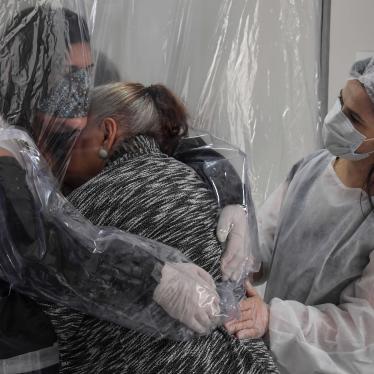Across the globe, people experiencing homelessness face serious risks—this was true before the Covid-19 pandemic.
In many wealthy countries, homelessness has come to be seen as a fact of modern society. Some governments have claimed it can’t be solved. The “homeless” themselves exist in the margins, invisible people whose basic right to adequate housing is easily forgotten by society and the people who avert their eyes as they rush past on the street.
But where flattening the Covid-19 curve requires extraordinary efforts, people without housing are starting to be seen as a public health problem to solve. If people living on the streets, in shelters, or in their cars are more vulnerable to an outbreak of highly communicable diseases like Covid-19, how can they effectively practice social distancing and self-isolate? How can they follow hygiene recommendations if they have nowhere for hand-washing, laundry, and personal hygiene?
Emergency shelters may not work now. Crowded facilities can be a recipe for rapid spread of disease as new stories of Covid-19 spreading at crammed homeless shelters in San Francisco, Boston, Dallas, Los Angeles, and other cities are emerging.
Faced with this pressure, some governments have suddenly found adequate housing for thousands of people in vacant hotel rooms, Airbnb units, hostels and other individual housing options. This allows access to hygiene facilities, and the space to effectively maintain social distancing. But most governments have identified these options as a short-term health measure.
In the Netherlands, the government has pledged to make 200 million Euros available to tackle homelessness in 2020 and 2021, including additional needs during the coronavirus crisis and more long-term solutions.
In the United Kingdom, there is a pledge of GBP 3.2 million to help the homeless self-isolate, in addition to GBP 492 million to end “rough sleeping” in 2020-2021. The funding will help local councils put emergency measures in place.
The French government has made available 50 million Euros and several hundred hotel rooms to accommodate people without housing, including a 15- million Euro voucher program to enable them to buy food and hygiene products during the pandemic.
In Germany, the Berlin Senate opened emergency overnight shelters and made available 350 full-time beds at a youth hostel and an aid facility where medical and psychological care is available for people without permanent housing.
In the United States, the state of California and a number of cities have made commitments to house people experiencing homelessness in hotels, motels, and RVs for the duration of the crisis. This applies both to people who are showing no Covid-19 symptoms and for medical respite housing while people are quarantined or recovering after diagnosis.
And yet, only a handful of governments, such as those in United Kingdom and the Netherlands, are talking about a permanent solution to homelessness and the drivers of homelessness. And even then it is not clear how these policies will play out since government plans to end “rough sleeping” are often twinned with harsh enforcement of criminal trespass laws, loitering laws, and where applicable, enforcement of immigration detention and detention under mental health powers.
Under international human rights law, everyone, without exception, has a right to adequate housing, and governments should be doing all they can to ensure that everyone can enjoy this right. Public health is one reason to do this. But basic humanity is most important.
While national, state and local officials, and homelessness advocates are understandably focused on the public health crisis, the question of what will happen after the virus’ threat subsides, lingers.
The economic fallout of the crisis is likely to increase the financial burden, especially in high-cost cities and drive more individuals and families into homelessness -- a long-term approach should consider such factors.
The steps taken relatively quickly by some governments in this public health crisis show what political will, some resources, and an emphasis on both collective good and individual dignity can achieve. These measures pave the way for the longer-term solutions governments should be designing to eradicate homelessness.
Housing is a human right, and it will remain so when the pandemic is contained. If governments can suddenly find housing now, they should be able to do so permanently.











